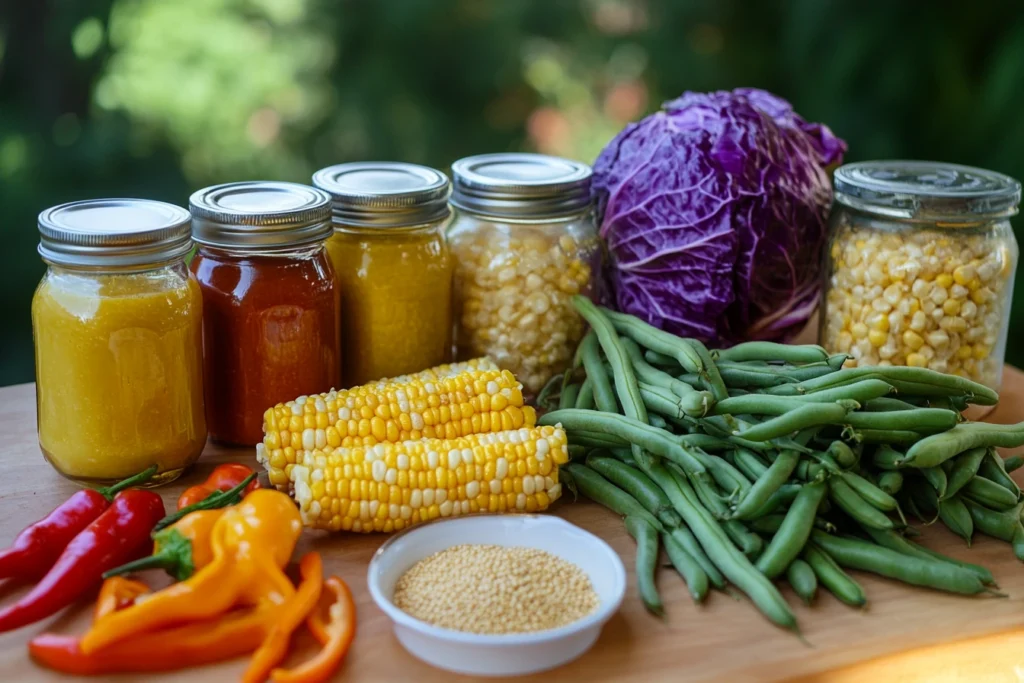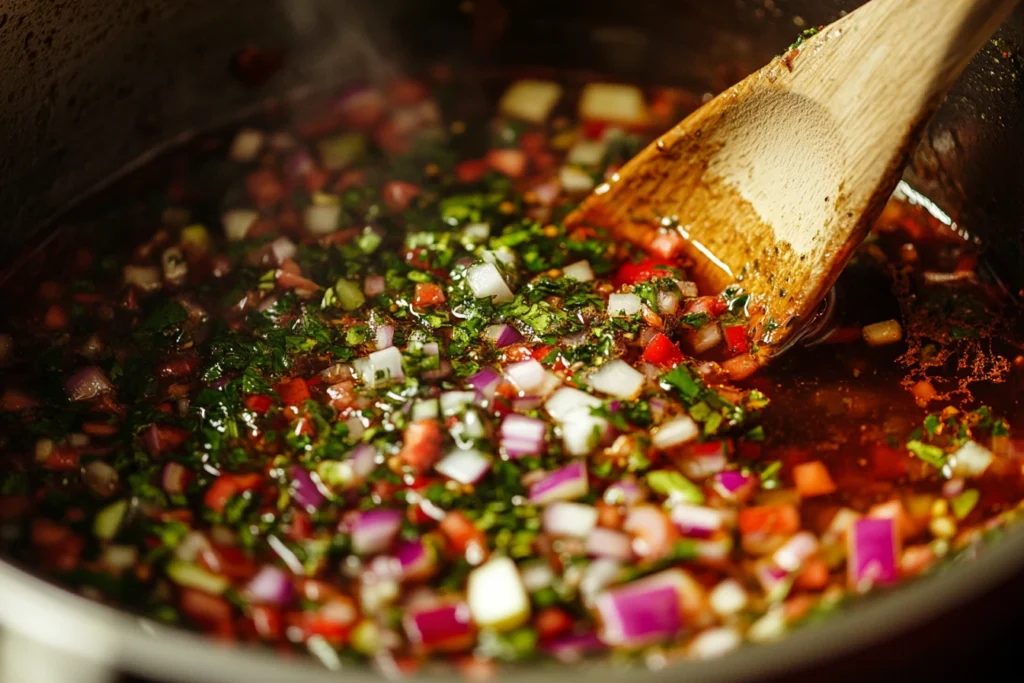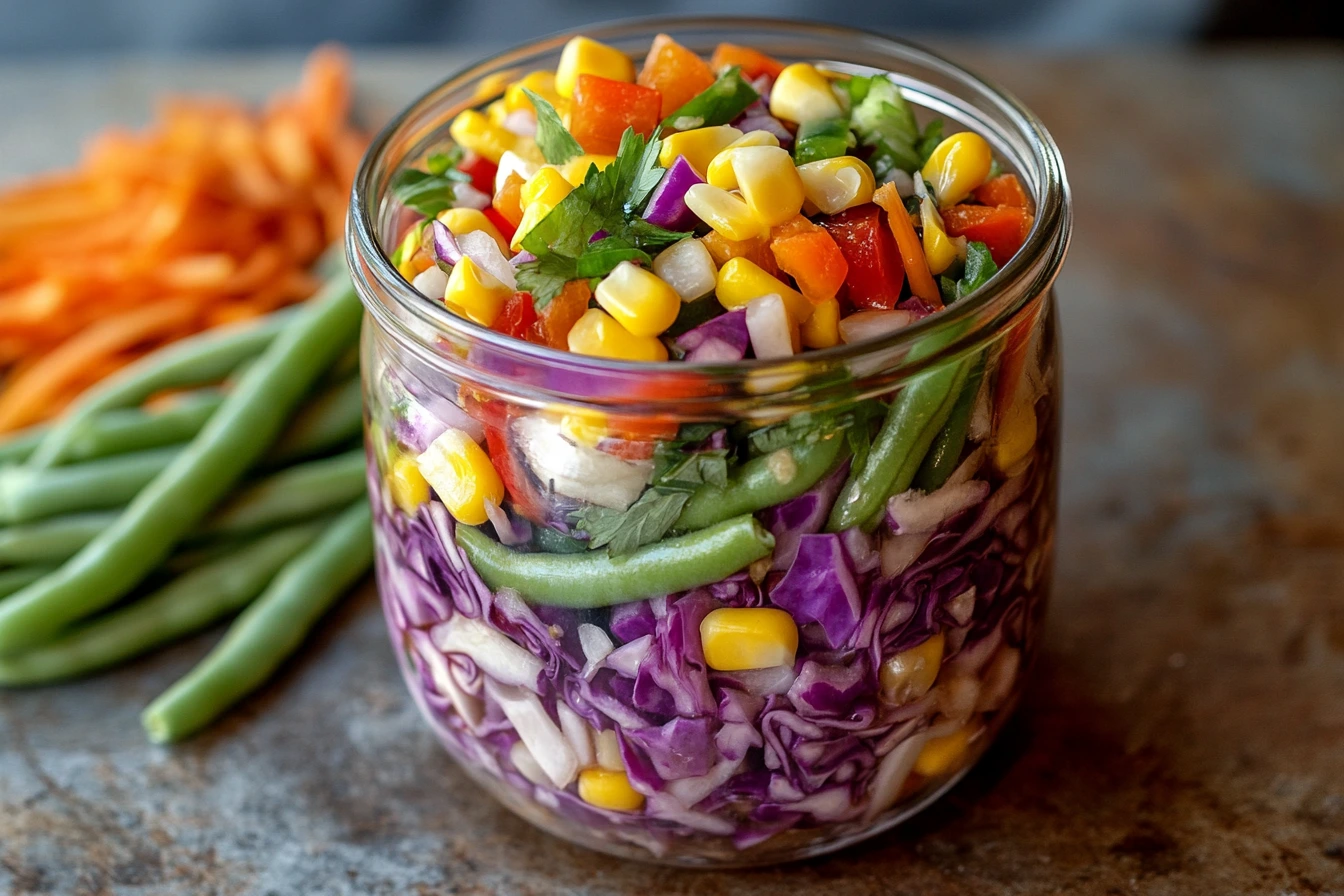Introduction to Amish Chow Chow
Amish Chow Chow is a cherished dish from the Amish community. This pickled relish offers a delightful balance of tangy, sweet, and sometimes slightly spicy flavors. It is a common addition to Amish meals because of its flavorful blend of vegetables and pickling brine. People enjoy it as a condiment, side dish, or even a snack.
The Historical and Cultural Roots of This Relish
The origins of this dish are deeply tied to Amish traditions. For instance, it was initially created to avoid wasting surplus vegetables at the end of the growing season. This approach reflects the community’s commitment to sustainability and resourcefulness.
Ditch Dinner Stress — Cook Smart, Not Hard 🍽️
35 quick & budget-friendly 5-ingredient dinners to save your evenings. Simple. Delicious. Ready in 30 minutes or less.
The relish typically features a mix of vegetables such as cabbage, carrots, green beans, cauliflower, and peppers. These are combined with a tangy brine made of vinegar, sugar, and spices. This preparation not only preserves the vegetables but also infuses them with a rich, tangy-sweet flavor. As a result, the relish has become a year-round favorite.
How It Differs from Other Versions
Although many cultures enjoy variations of Chow Chow, the Amish version stands out. For example, Southern Chow Chow often highlights green tomatoes and includes a spicy kick. By contrast, this version is typically milder and sweeter, with a wider variety of vegetables that reflect Amish agricultural practices.
Additionally, Amish recipes emphasize traditional spices like mustard seed, celery seed, and turmeric, which give the relish its distinctive flavor. These recipes are often passed down through generations, helping to preserve the authentic taste and cultural significance of the dish.
Core Ingredients in Amish Chow Chow

Amish Chow Chow is known for its flavorful and balanced combination of ingredients. Each component plays an important role in creating its unique taste. If you’re curious about a more detailed recipe, consider exploring “Chow Chow Recipe” for step-by-step instructions on making this versatile dish.
Vegetables
The variety of vegetables is one of the defining features of Amish Chow Chow. These vegetables not only add color and texture but also provide a rich mix of flavors.
Common Vegetables: Green Beans, Cabbage, Corn, Peppers
The base of Amish Chow Chow often includes green beans, cabbage, corn, and peppers. These staples bring a balance of crunchiness, sweetness, and freshness to the relish.
Optional Additions: Tomatoes, Lima Beans, or Celery
For additional variety, some recipes include tomatoes, lima beans, or celery. These ingredients enhance the flavor and add a personal touch, depending on what’s available or preferred.
Sweeteners
Sweeteners are essential in Amish Chow Chow to balance the tanginess of the vinegar and the natural flavors of the vegetables.
Use of Sugar or Natural Sweeteners
Most recipes use sugar as the primary sweetener. However, some opt for natural alternatives like honey or maple syrup for a more wholesome touch.
Vinegars
Vinegar is a critical ingredient in the pickling process, providing the characteristic tangy flavor.
Apple Cider Vinegar as a Key Ingredient
Apple cider vinegar is the most commonly used vinegar in Amish Chow Chow. It gives the relish its signature tang while complementing the sweetness of the other ingredients.
Spices and Seasonings
The spices and seasonings used in Amish Chow Chow create its warm and complex flavor profile.
Mustard Seed, Turmeric, and Celery Seed
Mustard seeds add a mild, tangy flavor and slight texture. Turmeric brings a subtle earthy taste and a vibrant yellow color. Celery seeds contribute a hint of savory flavor, tying all the ingredients together.
These core ingredients work harmoniously to create the distinct taste of Amish Chow Chow, making it a versatile and cherished dish.
Preparation Process for Amish Chow Chow

Making Amish Chow Chow involves several steps to ensure a perfect blend of flavors and textures. Below is a detailed look at the process.
Preparing the Vegetables
The first step in making Amish Chow Chow involves preparing the vegetables. Properly prepared vegetables result in a consistent texture and balanced flavors.
Chopping, Slicing, and Dicing Techniques
Each vegetable needs specific preparation. For example, you trim and cut green beans into bite-sized pieces. You finely chop or shred cabbage, while you dice peppers and celery for even sizes. If you include tomatoes, peel and chop them as well. Using uniform cuts ensures even cooking and a visually appealing dish.
Mixing Ingredients
After you finish preparing the vegetables, the next step is combining them with other ingredients.
Combining Vegetables with Sweeteners, Vinegars, and Spices
Place the chopped vegetables in a large mixing bowl or pot. Next, add sweeteners, such as sugar or honey, to balance the flavors. Pour in apple cider vinegar to create the tangy base. Then, thoroughly mix in spices like mustard seed, turmeric, and celery seed to coat the vegetables evenly. Stirring everything well ensures the flavors blend together smoothly.
Cooking and Simmering
The cooking stage brings out the flavors and ensures the right consistency.
Achieving the Right Consistency and Flavor Balance
Transfer the mixture to a large pot and bring it to a gentle boil. Once it starts boiling, lower the heat and simmer for 30 minutes to an hour, depending on the recipe. This step softens the vegetables slightly while preserving their crunch. Additionally, it allows the spices to infuse the mixture, creating a harmonious balance of sweet, tangy, and savory flavors. Pay attention to the cooking time to avoid making the vegetables too soft.
By following these steps carefully, you can create a delicious Amish Chow Chow that is ready to enjoy fresh or store for later.
How Amish Chow Chow is Traditionally Preserved
Preservation is a key part of making Amish Chow Chow. Traditional methods ensure it remains fresh and flavorful for extended periods.
Canning Process
Canning is the most common preservation method for Amish Chow Chow. It allows the relish to be stored safely without refrigeration.
Sterilizing Jars and Proper Sealing
The process begins with sterilizing jars to eliminate bacteria and ensure safe preservation. Jars and lids are boiled in water for several minutes before use. Once the Chow Chow mixture is prepared and simmered, it is ladled into the hot jars, leaving a small amount of headspace at the top. The rims are wiped clean to ensure a tight seal, and the lids are screwed on firmly. Finally, the filled jars are placed in a boiling water bath for 10–15 minutes to create a vacuum seal. Proper sealing is essential to prevent spoilage and maintain freshness.
Storage Guidelines
After canning, proper storage is necessary to preserve the quality of Amish Chow Chow.
Shelf Life and Ideal Storage Conditions
Once sealed, jars of Amish Chow Chow can last for up to one year when stored in a cool, dark place such as a pantry or cellar. It is important to keep them away from direct sunlight and extreme temperatures, which could compromise the seal or spoil the relish. Once opened, the Chow Chow should be refrigerated and consumed within a few weeks to maintain its best flavor and texture.
By following these preservation techniques, Amish Chow Chow can be enjoyed long after its preparation, making it a versatile and lasting addition to any meal.
Variations of Amish Chow Chow
Amish Chow Chow offers a range of variations, reflecting both regional influences and personal preferences. Although the core ingredients and preparation methods remain consistent, slight changes in recipes create unique flavors.
Sweet vs. Savory Versions
One of the main differences among variations is the balance between sweet and savory flavors.
- Sweet Versions: Some recipes use extra sugar or natural sweeteners like honey to enhance sweetness. These versions pair beautifully with rich or spicy dishes, as their sweetness complements bold flavors.
- Savory Versions: In contrast, savory recipes reduce the sugar and include spices like black pepper or garlic. This approach enhances the tangy and robust elements, making these versions ideal for lighter meals or as standalone snacks.
Regional Influences
Pennsylvania Dutch Version
The Pennsylvania Dutch version of Amish Chow Chow stays true to the traditional mix of green beans, cabbage, peppers, and other garden vegetables. This variation leans slightly sweeter, showcasing the preservation practices of Amish communities in the region. Apple cider vinegar and a carefully balanced spice blend give it a comforting and familiar flavor.
Common Uses of Amish Chow Chow
Amish Chow Chow is a versatile dish that enhances many meals. Its tangy and sweet flavor profile makes it suitable as a side dish, condiment, or ingredient in various recipes.
As a Side Dish
Amish Chow Chow often serves as a flavorful accompaniment to main dishes.
Served with Meats like Ham, Pork, or Sausage
Traditionally, Amish Chow Chow pairs well with savory meats such as ham, pork, or sausage. Its tangy and slightly sweet taste balances the richness of these proteins, making it a perfect addition to hearty meals.
As a Condiment
This relish can also function as a condiment, adding extra flavor to everyday meals.
Enhancing Sandwiches and Burgers
Amish Chow Chow adds a tangy crunch to sandwiches and burgers. It complements grilled meats and cheeses, transforming ordinary meals into something more flavorful and unique.
As an Ingredient
Beyond its role as a side or condiment, Amish Chow Chow can also be used as an ingredient in recipes.
Adding to Salads or Soups
A spoonful of Amish Chow Chow can brighten up salads or soups. It brings a zesty kick and additional texture to coleslaw, potato salads, or vegetable soups, elevating their overall flavor.
These versatile uses highlight why Amish Chow Chow is a staple in many households. Whether served on its own or incorporated into dishes, it consistently enhances the dining experience.
Nutritional Breakdown of Amish Chow Chow
Amish Chow Chow offers great flavor and important nutritional benefits thanks to its vegetable-rich ingredients. However, you should consider its sugar and sodium levels when including it in your diet.
Calories and Macronutrients
Amish Chow Chow is low in calories because of its vegetable base, making it a light and healthy addition to meals. Most recipes include small amounts of carbohydrates from sugar and trace amounts of protein from the vegetables. Additionally, it is typically low in fat unless the recipe uses added oils, which is rare in traditional versions.
Vitamins and Minerals from Vegetables
The wide variety of vegetables in Amish Chow Chow provides an excellent source of vitamins and minerals. For example, cabbage and peppers are rich in vitamin C, which supports your immune system. Green beans and carrots contribute vitamin A, which benefits eye health, along with fiber that aids digestion. These vegetables also supply small amounts of potassium, calcium, and iron, all of which are essential for overall health.
Sugar and Sodium Content
Amish Chow Chow, while healthy, often contains higher amounts of sugar and sodium. Many recipes use sugar to create the sweet flavor, which can raise the carbohydrate content. In addition, the pickling process and the salt in the brine can increase sodium levels. To reduce these, you can replace sugar with natural sweeteners like honey or reduce the salt to make it more suitable for health-conscious diets.
With a few adjustments, you can enjoy Amish Chow Chow’s bold flavors while keeping it a nutritious part of your meals. By carefully balancing sweetness and saltiness, this relish becomes both delicious and healthy.
Frequently Asked Questions About Amish Chow Chow
Amish Chow Chow is a beloved relish, but some questions often arise about its preparation, uniqueness, and storage. Here are clear answers to common inquiries.
Can Amish Chow Chow Be Made Without Sugar?
Yes, Amish Chow Chow can be made without sugar. Instead of sugar, you can use natural sweeteners like honey, maple syrup, or stevia for a healthier alternative. Some variations focus on tangy and savory flavors, omitting sweeteners entirely. Adjusting the sweetness allows you to tailor the recipe to dietary preferences or restrictions.
What Makes Amish Chow Chow Different from Other Chow Chow?
Amish Chow Chow stands out because of its emphasis on a variety of vegetables and its milder, sweeter flavor profile. Unlike Southern Chow Chow, which often features green tomatoes and has a spicier kick, Amish Chow Chow typically includes green beans, cabbage, and corn. The Amish version also relies on traditional pickling spices like mustard seed, turmeric, and celery seed, creating a balanced and complex flavor that reflects Amish culinary traditions.
How Long Does Amish Chow Chow Last After Canning?
Properly canned Amish Chow Chow can last up to one year when stored in a cool, dark place. To ensure longevity, use sterilized jars and check the seals after canning. Once opened, refrigerate the jar and consume the contents within a few weeks for the best flavor and freshness.
Conclusion
Recap of Key Ingredients
Amish Chow Chow is a delightful relish made from a blend of fresh vegetables, tangy vinegar, sweeteners, and flavorful spices. Key vegetables include green beans, cabbage, peppers, and corn, with optional additions like tomatoes or celery. The combination of apple cider vinegar, mustard seed, turmeric, and celery seed creates its signature tangy-sweet flavor. Together, these ingredients make Amish Chow Chow a versatile and flavorful addition to any meal. For more inspiration on preparing this traditional dish, you can explore “Chow Chow Recipe”.
Encouraging Homemade Amish Chow Chow
Making Amish Chow Chow at home allows you to enjoy its rich flavors while customizing the recipe to suit your tastes. Whether you prefer it sweet, tangy, or spicy, the flexibility of this dish ensures it can cater to various preferences. Additionally, understanding the difference between pickle relish and Chow Chow can help you appreciate its unique qualities. By following the traditional preparation and preservation methods, you can create a relish that not only enhances your meals but also reflects the timeless ingenuity of Amish cooking.
Homemade Amish Chow Chow is a rewarding project that brings together taste, tradition, and creativity. So why not try making it yourself and experience the charm of this beloved dish?
